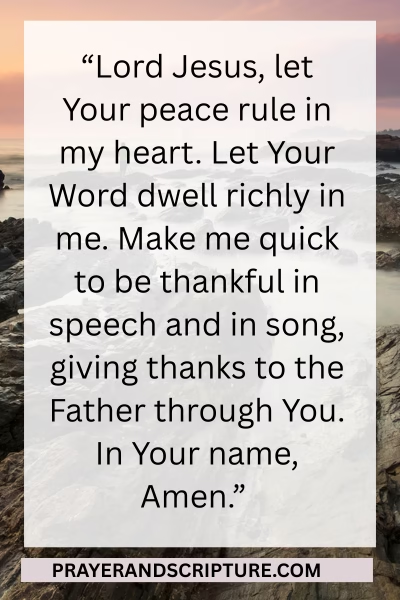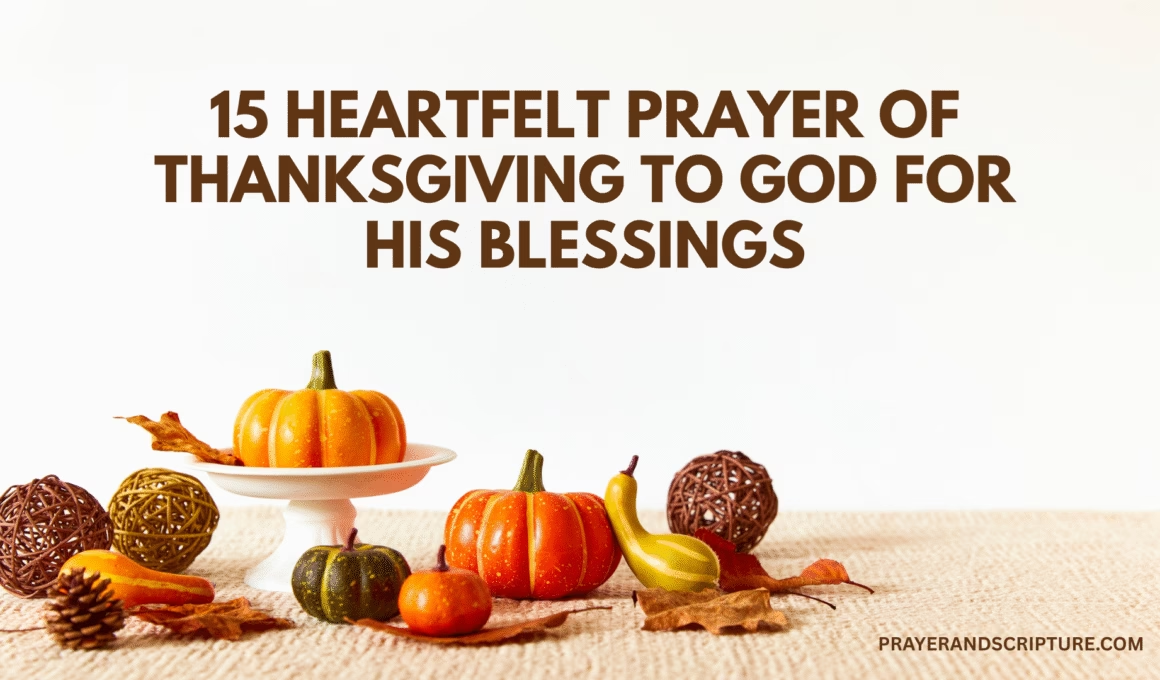A prayer of thanksgiving to God is not merely good manners—it’s spiritual oxygen. In thanksgiving, our voice rises to meet God’s voice, and the Holy Spirit tunes our hearts to the key of grace. When we pray the Word, the Father’s truth shapes our motives, the Son’s mercy renews our mind, and the Spirit’s presence strengthens our faith. Gratitude isn’t a mood we wait for; it’s a way of seeing that steadies us in both calm and storm. It’s how we learn to live a Christ-centered life—loving what He loves, trusting what He promises, and finding joy in His nearness.
I remember a quiet predawn morning at the kitchen table, steam lifting from a mug, the house still. A problem I couldn’t solve kept elbowing my peace. I opened to the Psalms and whispered thank yous I didn’t yet feel. Somewhere between God’s promises and my halting prayer, my shoulders lowered. The problem didn’t vanish, but it lost its throne in my mind. Gratitude had moved me from tight-fisted worry into open-handed worship. That’s the power of praying Scripture—it turns our ordinary places into altars and our anxious thoughts into pathways for peace.
Below are fifteen Scripture-shaped movements of gratitude. Each chapter offers a focus, a key verse, a simple explanation, why it matters for daily discipleship, a brief prayer, and one practical step. Let’s walk this road together—honoring the Father, delighting in the Son, and welcoming the Spirit.
Prayer of Thanksgiving to God for His Blessings
1. The goodness of God and His unfailing love
- Focus: Thank God for who He is—good and steadfast in love.
- Scripture (NIV, New International Version): “Give thanks to the LORD, for he is good; his love endures forever.” (Psalm 107:1)
- What it means:
- God’s goodness is not seasonal. It doesn’t rise and fall with our circumstances or moods; it’s His unchanging character.
- “His love endures forever,” declares a love that doesn’t run out, fade, or fail. God’s covenant love holds fast when everything else feels unsteady.
- Why it matters:
- Gratitude anchored in God’s character gives our praise stability when life wobbles. We learn to thank Him not only for His gifts but for His heart.
- Discipleship rooted in this verse becomes resilient—less swayed by headlines and more grounded in who God is.

- Pray:
- “Father, You are good, and Your love endures forever. Plant this truth deep in me, so my thanksgiving flows from Your character. In Jesus’ name, Amen.”
- Practice:
- Whisper Psalm 107:1 morning, midday, and night. Let each repetition slow your breathing and steady your heart.
2. Entering His presence with thanksgiving
- Focus: Gratitude is the doorway to worship.
- Scripture (ESV, English Standard Version): “Enter his gates with thanksgiving, and his courts with praise! Give thanks to him; bless his name! For the LORD is good; his steadfast love endures forever, and his faithfulness to all generations.” (Psalm 100:4–5)
- What it means:
- The temple language teaches us that thanksgiving is how we come in. It’s not a footnote—it’s the front door to God’s presence.
- His steadfast love and generational faithfulness are the grounds for gratitude, whatever our day holds.
- Why it matters:
- Beginning prayer with thanksgiving turns self-preoccupation into God-centered praise. It clears inner clutter and awakens awe.
- This posture shapes a life that receives grace rather than tries to manage it.
- Pray:
- “Lord, I enter Your presence with thanksgiving and Your courts with praise. I bless Your name because Your love and faithfulness endure. Father, Son, and Holy Spirit, keep me in this posture today. In Jesus’ name, Amen.”
- Practice:
- Before checking your phone tomorrow morning, speak one specific thank-you aloud. Picture yourself walking through His gates into the new day.
3. Giving thanks in all circumstances
- Focus: Honest gratitude in the middle of difficulty.
- Scripture (KJV, King James Version): “Rejoice evermore. Pray without ceasing. In every thing give thanks: for this is the will of God in Christ Jesus concerning you.” (1 Thessalonians 5:16–18)
- What it means:
- “In everything give thanks” does not mean we call evil good. It means we recognize God’s presence and purpose in the midst of anything.
- Rejoicing, constant prayer, and gratitude belong together as God’s will for us in Christ.
- Why it matters:
- If we wait for perfect conditions to give thanks, we will wait forever. Gratitude is a discipline that frees joy from the grip of circumstances.
- Thanksgiving doesn’t erase pain; it protects us from despair by anchoring us in God’s care.

- Pray:
- “God, you know what I am facing. I choose to give thanks in it because You are with me and at work for my good and Your glory. Help me rejoice, pray, and give thanks as Your will for me in Christ Jesus. In His name, Amen.”
- Practice:
- Write one honest sentence of gratitude about a current trial: “Thank You that You are with me and will not leave me.”
4. Joyful thanks for salvation in Christ
- Focus: Rehearse the rescue that defines us.
- Scripture (CSB, Christian Standard Bible): “giving thanks to the Father, who has enabled you to share in the saints’ inheritance in the light. He has rescued us from the domain of darkness and transferred us into the kingdom of the Son he loves. In him we have redemption, the forgiveness of sins.” (Colossians 1:12–14)
- What it means:
- The gospel is a rescue, not a tune-up. We were in darkness; the Father moved us into His Son’s kingdom.
- “Enabled, rescued, transferred, redemption, forgiveness”—salvation is God’s work from beginning to end.
- Why it matters:
- Remembering the gospel protects us from attaching identity to success or shame. Gratitude becomes the overflow of belonging to Jesus.
- Joy in redemption steadies daily discipleship—obedience becomes a grateful response, not grim duty.
- Pray:
- “Father, thank You for rescuing me from darkness and transferring me into the kingdom of Your beloved Son. Thank You for redemption and the forgiveness of sins. Let this joy guide my words and choices today. In Jesus’ name, Amen.”
- Practice:
- Write your salvation story in three sentences, focusing on what God did. Read it back to Him with thanks.
5. Peace through thankful prayer
- Focus: Turn worries into worship and receive God’s guarding peace.
- Scripture (NLT, New Living Translation): “Don’t worry about anything; instead, pray about everything. Tell God what you need, and thank him for all he has done. Then you will experience God’s peace, which exceeds anything we can understand. His peace will guard your hearts and minds as you live in Christ Jesus.” (Philippians 4:6–7)
- What it means:
- Nothing is too small for prayer. Thankfulness is not a polite add-on; it is the posture of trust that remembers God’s goodness before the answer comes.
- God’s peace, not our perfect plan, stands guard over heart and mind.
- Why it matters:
- Anxiety multiplies in silence and isolation. Thankful prayer breaks that cycle and opens space for the Spirit’s calm.
- Gratitude trains us to see present grace, not just past provision.

- Pray:
- “Father, here are the concerns I’m carrying… I thank You for what You have done and for being with me now. Please guard my heart and mind with Your peace in Christ Jesus. Teach me to turn worries into worship. In Jesus’ name, Amen.”
- Practice:
- When anxiety rises, name three specific gifts you’re grateful for, then present one request to God and ask for His guarding peace.
6. Overflowing with gratitude as we grow
- Focus: Roots in Christ produce a life that spills over in thanksgiving.
- Scripture (NASB 1995, New American Standard Bible 1995): “Therefore as you have received Christ Jesus the Lord, so walk in Him, having been firmly rooted and now being built up in Him and established in your faith, just as you were instructed, and overflowing with gratitude.” (Colossians 2:6–7)
- What it means:
- We begin with Christ and continue with Christ—rooted, built up, established in Him.
- Overflow reveals what fills us. When grace fills the heart, gratitude exceeds the container.
- Why it matters:
- Gratitude is formation, not just reaction. It trains our eyes to notice grace and our hands to share it.
- A thankful spirit is quiet evangelism: it hints that Jesus is enough.
- Pray:
- “Lord Jesus, as I received You, help me walk in You. Root me deeply, build me up, establish my faith, and cause gratitude to overflow. In Your name, Amen.”
- Practice:
- Keep a brief gratitude journal. Each evening, record three specific graces you noticed today.
7. Returning to Jesus with thanks
- Focus: Gratitude that runs back to the Giver.
- Scripture (NKJV, New King James Version): “And one of them, when he saw that he was healed, returned, and with a loud voice glorified God, and fell down on his face at His feet, giving Him thanks… Then He said to him, ‘Arise, go your way. Your faith has made you well.’” (Luke 17:15–16, 19)
- What it means:
- Ten were healed; one returned. Gratitude isn’t a nod of courtesy—it’s worship that comes back to the Source.
- He praised loudly and bowed low. Thanksgiving is both confession and posture.
- Why it matters:
- Gratitude keeps us near the Healer, not merely satisfied with the healing.
- Returning to Jesus with thanks tenderizes our faith and trains our memory to notice mercy.
- Pray:
- “Lord Jesus, I return to say thank You. I fall at Your feet in worship. Make me the one who remembers and comes back with praise. Deepen my faith as I live gratefully. In Your name, Amen.”
- Practice:
- Thank someone who reflected God’s grace to you today, and then thank God for that person by name.
8. Every good and perfect gift
- Focus: Spot the Giver behind every good gift.
- Scripture (NIV): “Every good and perfect gift is from above, coming down from the Father of the heavenly lights, who does not change like shifting shadows.” (James 1:17)
- What it means:
- Good gifts vary—sunrises, friendships, timely words—but the Giver is constant and kind.
- Our Father’s generosity does not change with seasons or moods.
- Why it matters:
- Recognizing God’s hand in ordinary blessings turns daily life into doxology.
- Gratitude uproots envy and entitlement; contentment grows where thanks takes root.
- Pray:
- “Father of lights, thank You for every good and perfect gift. Open my eyes to Your generosity today. Keep my heart content and my hands open. In Jesus’ name, Amen.”

- Practice:
- Take a five-minute “Thanksgiving walk.” Name aloud as many gifts as you can spot—from the color of the sky to the breath in your lungs.
9. The sacrifice of thanksgiving
- Focus: Offering thanks when it costs you something.
- Scripture (ESV): “The one who offers thanksgiving as his sacrifice glorifies me; to one who orders his way rightly I will show the salvation of God!” (Psalm 50:23)
- What it means:
- There are days when gratitude feels costly. God calls that offering worship that glorifies Him.
- “Orders his way rightly” speaks to choosing trust and obedience even when feelings falter.
- Why it matters:
- Sacrificial thanks teaches us to rely on God rather than our emotions.
- Gratitude in pain guards the heart from bitterness and opens us to fresh glimpses of God’s saving help.
- Pray:
- “Lord, here is my sacrifice of thanksgiving. It isn’t easy today, but I offer it to you. Order my steps and show me Your salvation. In Jesus’ name, Amen.”
- Practice:
- Write a brief note to God, naming one hard place and one promise you’re holding. Thank Him for meeting you there.
10. Magnify the Lord with thanksgiving
- Focus: Let gratitude sharpen your view of God.
- Scripture (KJV): “I will praise the name of God with a song, and will magnify him with thanksgiving.” (Psalm 69:30)
- What it means:
- Thanksgiving is a lens. It doesn’t make God bigger; it brings His greatness into clearer focus in our hearts.
- Praise and thanks tune the soul like a musician tunes an instrument.
- Why it matters:
- A magnified view of God reduces fear and right-sizes problems.
- Gratitude keeps worship genuine—more than a habit, it becomes a heartfelt response.
- Pray:
- “Father, I praise Your name with a song. I choose to magnify You with thanksgiving. Bring Your greatness into sharp focus in my heart. In Jesus’ name, Amen.”
- Practice:
- Sing a hymn or chorus, even softly. Name one attribute of God you’re thankful for and tell Him why.
11. Let Christ’s peace rule and the Word dwell richly
- Focus: A thankful atmosphere in heart and community.
- Scripture (ESV): “And let the peace of Christ rule in your hearts, to which indeed you were called in one body. And be thankful. Let the word of Christ dwell in you richly… singing psalms and hymns and spiritual songs, with thankfulness in your hearts to God… giving thanks to God the Father through him.” (Colossians 3:15–17)
- What it means:
- Christ’s peace should umpire our hearts—calling the shots when conflict or anxiety presses in.
- The Word should make its home in us richly, and the natural soundtrack of that home is thanksgiving.
- Why it matters:
- Thankfulness cultivates unity and softens our speech. It fuels songs, service, and everyday holiness.
- A Word-filled life becomes a thank-filled life; Scripture fuels gratitude.

- Pray:
- “Lord Jesus, let Your peace rule in my heart. Let Your Word dwell richly in me. Make me quick to be thankful—in speech and in song—giving thanks to the Father through You. In Your name, Amen.”
- Practice:
- Before a meeting or family meal, pause and thank God for one specific way He has been faithful to your group this week.
12. His faithful love endures forever
- Focus: Gratitude that echoes through every season.
- Scripture (NLT): “Give thanks to the Lord, for he is good! His faithful love endures forever. Give thanks to the God of gods. His faithful love endures forever. Give thanks to the Lord of lords. His faithful love endures forever.” (Psalm 136:1–3)
- What it means:
- The refrain repeats intentionally—God’s loyal love is the anchor line across history and across your day.
- Thanksgiving rehearses the steady mercy that keeps holding us.
- Why it matters:
- Repetition trains the soul. Saying “His faithful love endures forever” teaches our hearts to hope.
- The refrain works in sunshine and shadows, telling the same steady truth.
- Pray:
- “Faithful Lord, I give You thanks. Your loyal love endures forever. Write this refrain on my heart and lips today. In Jesus’ name, Amen.”
- Practice:
- Set three reminders today. When they sound, pause and say aloud, “His faithful love endures forever,” applying it to the moment you’re in.
13. Daniel’s daily rhythm of gratitude
- Focus: Thanksgiving as a holy habit.
- Scripture (NASB 1995): “Now when Daniel knew that the document was signed, he entered his house… and he continued kneeling on his knees three times a day, praying and giving thanks before his God, as he had been doing previously.” (Daniel 6:10)
- What it means:
- Under pressure, Daniel didn’t invent a new strategy; he kept a well-worn practice—three times a day, praying and giving thanks.
- Gratitude was rhythmic, not reactive.
- Why it matters:
- Holy habits guard us when life shakes. Rhythms of thanks steady the heart and prepare us to trust.
- Small, repeated practices form large, resilient faith.
- Pray:
- “God, like Daniel, teach me a steady rhythm of thanksgiving—morning, noon, and night. Make this practice a shelter in every storm. In Jesus’ name, Amen.”
- Practice:
- Choose three anchor points in your day (breakfast, midday, bedtime). At each pause and thank God for one specific gift.
14. Gratitude and contentment
- Focus: Thanksgiving quiets restless desire.
- Scripture (ESV): “But godliness with contentment is great gain, for we brought nothing into the world, and we cannot take anything out of the world. But if we have food and clothing, with these we will be content.” (1 Timothy 6:6–8)

- What it means:
- Contentment isn’t apathy or denial; it’s the quiet wealth of a heart satisfied in God’s care.
- Gratitude helps us enjoy what we have without being enslaved to what we lack.
- Why it matters:
- Our culture trains us to crave more. Thanksgiving reminds us to see enough—and to see the Giver in our daily bread.
- Contentment frees us to be generous and joyful, unhooking our peace from possessions.
- Pray:
- “Father, teach me godliness with contentment. Thank you for today’s provision. Guard my heart from grasping. Make me grateful and generous. In Jesus’ name, Amen.”
- Practice:
- Pray before each meal this week with one added sentence: “Lord, I receive this as a gift from Your hand.”
15. Gratitude that overflows in generosity
- Focus: Thanksgiving multiplies through love in action.
- Scripture (NIV): “You will be enriched in every way so that you can be generous on every occasion, and through us your generosity will result in thanksgiving to God. This service that you perform is not only supplying the needs of the Lord’s people but is also overflowing in many expressions of thanks to God.” (2 Corinthians 9:11–12)
- What it means:
- God enriches us so we can be generous. Our generosity sparks thanksgiving to God in other people’s lives.
- Gratitude is contagious; it multiplies as we share what God has given

- Why it matters:
- Thankful hearts become open hands. We join God’s mission by meeting real needs and pointing to the Giver.
- Gratitude and generosity feed each other, lifting our eyes from ourselves to God’s kingdom.
- Pray:
- “Generous Father, thank You for every way You enrich my life. Make me generous so others will give thanks to You. Let my life result in many expressions of thanks to God. In Jesus’ name, Amen.”
- Practice:
- Meet one practical need this week—groceries, a ride, a bill, a meal, your time—and quietly ask God to turn that act into thanksgiving in someone’s heart.
Before we close, breathe in what we’ve walked through. Thanksgiving starts with God’s character and spills into prayer, community, endurance, contentment, and mission. It transforms ordinary hours into a living hymn. It doesn’t deny pain; it invites God into it and says, “You are still good. Your love still holds.” And the more we pray the Word, the more our words take the shape of worship.
Here’s a simple next step—a seven-day prayer of thanksgiving challenge drawn from seven anchor Scriptures above. Small steps, open Bible, steady heart.
- Day 1 — Psalm 107:1 (NIV): “Give thanks to the LORD, for he is good; his love endures forever.”
- Pray: Thank God specifically for His goodness and unfailing love in your past.
- Practice: Repeat the verse morning, noon, and night.
- Day 2 — Psalm 100:4–5 (ESV): “Enter his gates with thanksgiving…”
- Pray: Begin your prayers by blessing His name before any requests.
- Practice: Picture walking through His gates into the day.
- Day 3 — 1 Thessalonians 5:16–18 (KJV): “In every thing give thanks…”
- Pray: Name one hard thing and give thanks in it, asking for grace to rejoice.
- Practice: Write one honest sentence of gratitude about that situation.
- Day 4 — Colossians 1:12–14 (CSB): “He has rescued us…”
- Pray: Tell God your three-sentence salvation story and thank Him.
- Practice: Share one sentence of that story with a friend or family member.
- Day 5 — Philippians 4:6–7 (NLT): “Don’t worry about anything…”
- Pray: Turn one worry into worship and ask for His guarding peace.
- Practice: Name three gifts, then present one request to God.
- Day 6 — Colossians 2:6–7 (NASB 1995): “overflowing with gratitude.”
- Pray: Ask Jesus to root and build you up in Him so that thanks overflows.
- Practice: Journal three fresh graces you noticed today.
- Day 7 — Luke 17:15–16, 19 (NKJV): “He returned… giving Him thanks.”
- Pray: Return to Jesus with thanks for a recent mercy.
- Practice: Thank a person who reflected God’s kindness to you, and then thank God for them.
And if you want to extend the journey, try a weekly rhythm:
- Speak it: Tell someone each day one thing you thank God for.

- Sing it: Turn a verse into a whispered song when your heart feels heavy.
- Share it: Give in a practical way and ask God to turn it into thanksgiving in another life.
A brief recap of the seven anchors we practiced:
- Psalm 107:1 (NIV)—Thank God for His unchanging goodness and enduring love.
- Psalm 100:4–5 (ESV)—Enter His presence with thanksgiving and praise.
- 1 Thessalonians 5:16–18 (KJV)—Rejoice, pray, and give thanks in all circumstances.
- Colossians 1:12–14 (CSB)—Celebrate the Father’s rescue and the Son’s redemption.
- Philippians 4:6–7 (NLT)—Pray with thanksgiving and receive guarding peace.
- Colossians 2:6–7 (NASB 1995)—Walk rooted in Christ until gratitude overflows.
- Luke 17:15–16, 19 (NKJV)—Return to Jesus with thanks and find faith deepened.
Conclusion
Friend, God’s goodness is not fragile, and His love will not let you go. As you pray the Word and let the Word pray you, may thanksgiving become the natural language of your life. May the Father’s generosity surround you, the Son’s grace uphold you, and the Spirit’s peace guard you. And may your days—ordinary, difficult, and beautiful—become a living hymn that sings again and again, “Thank You, Lord.”
For more Thanksgiving prayers:
- 50+ Happy Thanksgiving Prayer To Transform Your Heart
- End Of Month Thanksgiving Prayer Points
- Prayer of Thanksgiving for All the Blessings
Read our Midnight Prayer Scriptures to end your day with peace and thankfulness!
Pray through the week with us:



